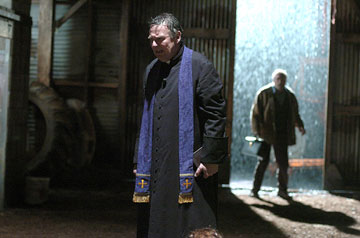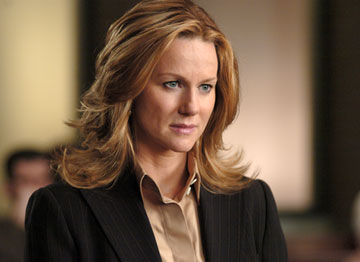

Is it a horror movie, or is it a courtroom thriller? The Exorcism of Emily Rose is a bit of both, and because it tries to be both, each aspect suffers a bit. Because of its structure, the movie does not work as a horror film, and despite the presence of Laura Linney, Campbell Scott, and Tom Wilkinson, the courtroom theatrics are a bit too standard in order for the viewer to truly care. Emily Rose is more of a courtroom thriller with tinges of horror and it does generate some dramatic moments, but overall, it is too choppy and at times unintentionally funny.
Director Scott Derrickson (Ghosting, Hellrasier: Inferno), who co-wrote the screenplay with Paul Harris Boardman (Ghosting, Urban Legends: Final Cut) based the story on "actual events." Catholic priest Father Moore (Wilkinson, Batman Begins, Stage Beauty) was put on trial for the murder of college student Emily Rose (Jennifer Carpenter, White Chicks, D.E.B.S.). Moore believed that Rose was possessed, and was performing an exorcism on her. The government believes otherwise, and Ethan Thomas (Campbell Scott, Saint Ralph, The Secret Lives of Dentists) is vigorously prosecuting him. Defending Moore is Erin Bruner (Linney, Kinsey, P.S.), a defense attorney who wants this case to further her rising career.
Derrickson tells most of the story from the stand. Testimony changes into extended flashbacks, where Rose's condition gradually worsens. The people around her believe that she suffers from a form of epilepsy, but when medical treatment does not work, her family brings in Moore as a last resort. The exorcism scenes are fairly standard. Carpenter's freak-outs get increasingly worse. She thinks she sees all sorts of demons in the people around her. She yells, screams, speaks in Latin, and becomes super-strong. Moore tries his best to stand up to the presence within her. The main difference is that Derrickson moves the camera around wildly, affecting a sense of chaos. It's not clear who is in control, and worse, it looks like Moore is in over his head. He also takes things outdoors, including a harrowing sequence in a barn. Again, it is not the exorcism itself that is original, it is the way in which Derrickson films it.
Back in the courtroom, the viewer has the misfortune of watching dramatic heavyweights Scott and Linney recite some pretty pedestrian lines. This court is the same court that is in all movies. Everything is overly dramatic. Thomas sneers and pushes the limit of what he can and cannot say. Bruner presents a highly unorthodox argument based on the validity of exorcism and the existence of demonic possession. Of course, Thomas pouts and complains. Scott and Linney are can do so much more. They are capable of bringing an amazing presence to the screen, and it is their acting ability that saves much of the dialogue from becoming overtly ridiculous. The Exorcism of Emily Rose is also about the spiritual journey that Bruner takes. She is an agnostic (interestingly enough, Thomas is a believer). Nevertheless, as the trial progresses, Moore tells her that she is under spiritual attack. She cannot explain some of the things happening around her, and begins to question her beliefs. This is probably the most interesting aspect of the film, but gets buried amongst courtroom theatrics and exorcism cliches.